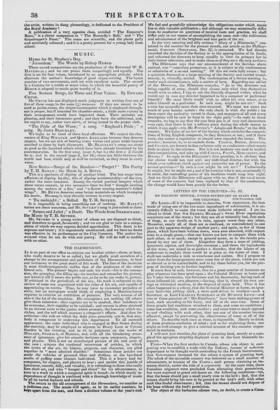MUSIC.
Hymn for St. Stephen's Day. ' • Jerusalem." The Words by Bishop HEBER.
These sacred compositions are the production of the Reverend W. H. IIAVERGAL ; and we can praise them unsparingly and equally. The first is set for four voices, introduced by an appropriate prelude, which discovers the author's knowledge of good organ-writing. The hymn consists of two movements, each set with excellent taste. The second is a Cantata for a treble or tenor voice, in which the beautiful poetry of HERE ft is adapted to music quite worthy of it.
Five Serious Songs, for Three and Four Voices. By EDWARD CRUSE.
Mr. CRUSE has not displayed much judgment in writing four out of five of these songs iii the same (I) measure. If they are meant to be used as psalm-tunes, the simple counterpoint which is employed throughout is proper, but if intended for chamber-music, a little more variety in their arrangement would have improved them. Their melodies are pleasing, and their harmonies good ; and they have the additional, and, we regret to say, rather rare merit, of being scored in the proper clefs.
"The Pride of the Wave;" a song. "England's Pride ; " a song. By JOHN BLOCKLEY. We begin to be tired of these loyal effusions. We respect the characters of King WILLIAM and Queen ADELAIDE because they deserve respect, but we are sick of hearing every virtue and grace under heaven ascribed to them by hack rhyrnsters. Mr. BLOCKLEY'S songs are about as good as the hundred others which have been already furnished by his contemporaries. In the first song, (page 2, bar 5,) the first C # should be ; and in the second (page 2, bar 16,) there are fifths between the treble and bass, which may as well be corrected, as they recur in every -verse.
New Series—Songs of the Boudoir—" Forget !" The Poetry by T. H. BAYLY ; the Music by A. BETTS.
This is a specimen of slipslop of another kind. The last songs were effusions of slipslop loyalty, this of slipslop sentimentality—of the two, rather the more nauseous. Among the varied poetical imagery which these verses contain, in two successive lines we find " thought nestling among the embers of a fire," and "a flower rousing memory's folded -wings". Mr. BETTS deserves some better materials on which to employ Ids music, His song is very cleverly written in every respect.
" 'Tis midnight ;" a Ballad. By T. H. SEVERN. It is impossible to bring something out of nothing. Mr. BAYLY'S verses are sheer nonsense, and Mr. SEVERN'S song is just suited to them "Romeo and Juliet ;" a Duett. The Words from SHAKSPEARE ; the Music by T. H. SEVERN. Mr. SEVERN is a young writer of whom we are disposed to think, and therefore to speak, favourably ; and we are glad to turn to a composition of which we may express decided approbation. This duett is for soprano and tenor ; it is ingeniously constructed, and we have no doubt was effective in its performance at the City Concerts. The author has evinced what he can do with real poetry. He will do well to meddle with no other.


























 Previous page
Previous page